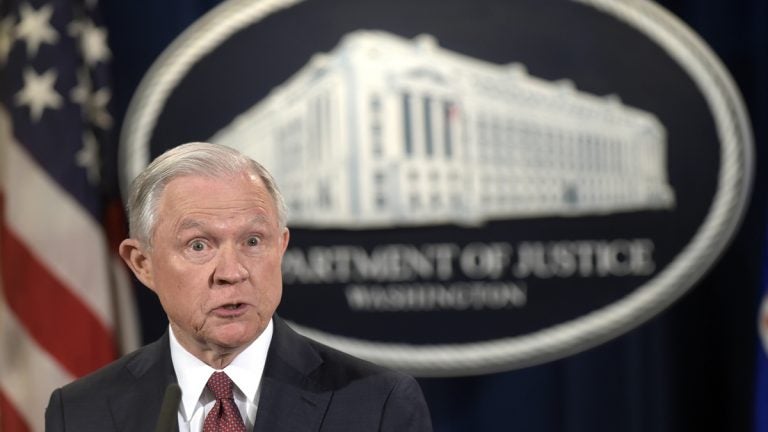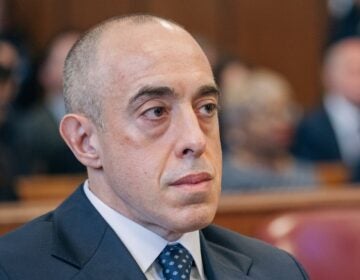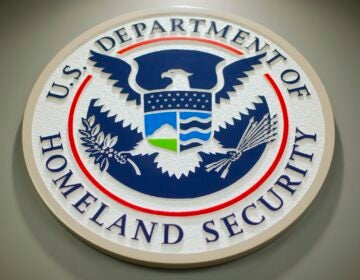How far-reaching are the president’s powers on DACA?
The Trump administration recently put an expiration date on the Obama-era program called Deferred Action for Childhood Arrivals. Is action of either president lawful?

Attorney General Jeff Sessions makes a statement at the Justice Department in Washington, Tuesday, Sept. 5, 2017, on President Barack Obama's Deferred Action for Childhood Arrivals, or DACA program. (AP Photo/Susan Walsh)
The Trump administration recently put an expiration date on the Obama-era program Deferred Action for Childhood Arrivals that’s known as DACA. That program shields 800,000 young immigrants who have been brought to the United States — not of their own volition, but as companions to their parents. Removing this protection would expose those young “dreamers” to immigration enforcement actions, which would ultimately mean deportation to countries many of them have not seen since birth. Is what he did — and what President Obama did before him — lawful?
Politicians and pundits from both political parties have criticized on moral grounds the administration’s decision to terminate DACA. After all, the United States is the only home that many of these young people have ever known. And because of that program, they have been able to live and work outside of the shadows, contributing to an economy in need of young workers. Our aging population, which is placing greater and greater strain on our Social Security and Medicare systems, requires a cadre of young people paying into those systems through their labor and taxes to keep our economy afloat. In fact, several states have sued the administration over the economic impact that deportation of these young workers would have on their economies.
If this matter were purely a question of morality, we as Americans would be hard pressed to find an argument that justifies sending the “dreamers” away from their true home in the United States. If this matter were purely a question of economics, we would be hard pressed to justify sending away significant drivers of our economic growth — young, educated workers. But this is also a question of law. Did Obama, who enacted DACA, have the legal authority to shield dreamers from deportation and grant them the right to work when our immigration laws provide no such authority?
Congress is the only entity in our government tasked with making laws. However, the president has a great deal of power in deciding how those laws are enforced. Executive agencies, under the direction of the president, determine the ways in which laws will be carried out on the basis of financial resources, manpower, and policy priorities.
The law is clear with respect to dreamers — they are unlawfully present. But the DACA program applied the law in a way that made dreamers non-priorities for enforcement and that allowed them the opportunity to earn a living while awaiting congressional action on immigration reform or deportation should they violate the terms of the DACA program. With at least 11 million undocumented immigrants in the United States and more arriving every day, federal enforcement agencies must allocate limited resources carefully. It would seem to make sense to focus those resources on threats to society rather than on those who are sustaining our society.
Attorney General Jeff Sessions, a strong opponent of the DACA program, has argued that the program was an unconstitutional abuse of executive power and that only Congress has the authority to change laws. His interpretation assumes that the president changed the law itself. He did not. However, interpreting how the law is enforced is not only within the power of the executive — it is a logical approach to resource management. Dreamers were never promised legal status nor were they ever completely out of the reach of immigration- enforcement authorities should enforcement priorities change. DACA was a Band-Aid put on the scar of American immigration policy, which Congress has failed to reform for decades.
The Trump administration’s decision to terminate DACA removes from the debate the argument that it may have been an impermissible use of executive power. Nevertheless, he has asserted that he is willing to extend the program a bit longer if Congress fails to act in reforming the law. There are no strong moral or economic arguments against allowing the dreamers to stay and continue contributing to our society. But it is up to Congress to find a permanent solution to what should be a bipartisan legislative success story. Whether they choose to act to protect the American economy and these young American dreamers is far less certain.
—
Kevin J. Fandl, J.D., Ph.D., is an assistant professor of legal studies at Temple University’s Fox School of Business, where he also serves as Academic Director of Global Immersion Programs. Prior to his career in academia, he worked as a lawyer and adviser on immigration policy with U.S. Immigration and Customs Enforcement. His article, “Presidential Power to Protect Dreamers: Abusive or Proper?” will appear in the Yale Law & Policy Review Inter Alia online in the coming weeks.
WHYY is your source for fact-based, in-depth journalism and information. As a nonprofit organization, we rely on financial support from readers like you. Please give today.




